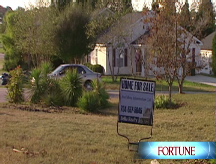How to rebuild America
The era of small government is dead. We need a strong, skillful Washington again to start rebuilding America from the ground up.
 |
| Source: Office of Management and Budget |
(Fortune Magazine) -- It's certainly not morning in America.
Yet it doesn't have to be twilight either. America can pull through the current economic crisis with a dose of political maturity and a bit of luck. Success will mean the end of the Reagan era, of an ideology that has brought the country to its knees.
Ronald Reagan told us that government was the problem, and that low taxes and deregulation were the solutions. The result, even more than Americans recognize, is a government so shrunken in skill and mandate that our gravest problems - financial collapse, natural hazards like Hurricane Katrina, broken health care and education, unsustainable energy systems, and growing global instability - are left without a serious response.
Either we once again invest in our future, notably through an expanded public sector, or we will lose our future.
I presume that John McCain and Sarah Palin will lose the election. Never has a national ticket been less equipped intellectually, temperamentally, and practically to confront America's problems than this one. I also presume that Palin's winks to America will prove to be the equivalent of the Cheshire Cat's grin: the last expressions of an ideology disappearing from the scene.
Yet Barack Obama will soon find himself and our country in a labyrinth of difficulties requiring a new approach to public policy. The Reagan-era small-government ideology is defunct, and so too is the modest corrective that characterized Bill Clinton's "triangulation" with the right.
In the immediate future the greatest challenge is to stop what George Soros has called the "wrecking ball" of unregulated finance, the consequence of turning the economy's keys over to Wall Street.
Vast sums of money, untethered from the traditional capital-adequacy standards of commercial banks, inflated a gargantuan housing bubble that has now burst. The outflow has been violent in the other direction, as short-term funds from pensions, money markets, and foreign lenders have suddenly fled to safe havens. The housing market and consumer credit are in collapse. Wall Street's shadow banks have closed down. Money market funds are so spooked after Lehman's bankruptcy that they won't buy AAA commercial paper.
When AAA isn't good enough, we know that panic and fear have taken over.
The immediate need is to save the financial system through ample liquidity from the Federal Reserve, government backing of the commercial-paper market, and banking sector recapitalization, mainly by private money but also from public funds as needed.
Giving homeowners relief from foreclosures will be an important social policy and a way to return mortgage-backed securities to a partial-repayment basis. Unfortunately, the Paulson-Bernanke $700 billion bailout, aimed at buying mortgage-backed securities from the banks, addresses none of these issues, as the world's financial markets realized the moment the legislation was passed. The new President will have to modify the plan starting on Jan. 20 so that the vast sums voted by Congress will contribute more directly to banking recapitalization and the timely restructuring of existing mortgages.
Stopping the wrecking ball with these measures will take a while, probably at least through 2010 or 2011. These steps will prevent an economic collapse similar to the Great Depression or even to that of Asia in 1997, when several economies shrank by 10% or more.
By keeping credit markets open for business, the government can prevent an outright collapse, a depression, but that will not stop a recession in the U.S., centered on a steep fall in housing construction and consumer spending. The U.S. economy is likely to shrink by a few percent of GDP in 2009, and unemployment is likely to rise by a few percentage points. All of this will hurt badly.
Yet the greater challenge is not simply to stop a collapse, and certainly not to resurrect the housing bubble, an impossible and misguided goal that is still widely espoused through one scheme or another to get mortgages flowing again.
The deeper problems come back to Reaganomics. By next year we will find not only a shuttered housing market and weakened banking system but also a budget deficit exceeding $500 billion and perhaps as high as $750 billion or more, including charges for the financial bailout. The larger figure would amount to 5% of GDP, the highest proportion since the Reagan years. America will have gone through a decade of minimal household saving (made possible, of course, by the defunct easy access to mortgage financing and consumer credit) and will have borrowed, cumulatively, around $4 trillion from abroad since 1998, mainly from Asia. And we haven't even begun to address the challenges of climate change, broken infrastructure, health care, and schools.
For these reasons, we need to begin the transition back to national saving, both by government and by households. Now that easy financing has dried up, consumer spending will weaken dramatically, aggravating the pain in the short run.
For households, this can and should be the transition to positive saving and rebuilding net financial assets. Housing construction will remain low for several years, as will purchases of consumer durables like automobiles and home furnishings. The dollar should weaken, which will direct some of the resulting excess productive capacity toward exports, thereby reducing and eventually eliminating our heavy dependency on foreign saving. As a rich country, the U.S. should be a capital lender to the world, not a net borrower.
-
 The retail giant tops the Fortune 500 for the second year in a row. Who else made the list? More
The retail giant tops the Fortune 500 for the second year in a row. Who else made the list? More -
 This group of companies is all about social networking to connect with their customers. More
This group of companies is all about social networking to connect with their customers. More -
 The fight over the cholesterol medication is keeping a generic version from hitting the market. More
The fight over the cholesterol medication is keeping a generic version from hitting the market. More -
 Bin Laden may be dead, but the terrorist group he led doesn't need his money. More
Bin Laden may be dead, but the terrorist group he led doesn't need his money. More -
 U.S. real estate might be a mess, but in other parts of the world, home prices are jumping. More
U.S. real estate might be a mess, but in other parts of the world, home prices are jumping. More -
 Libya's output is a fraction of global production, but it's crucial to the nation's economy. More
Libya's output is a fraction of global production, but it's crucial to the nation's economy. More -
 Once rates start to rise, things could get ugly fast for our neighbors to the north. More
Once rates start to rise, things could get ugly fast for our neighbors to the north. More












